S & H Opera Review
Shostakovich, Lady Macbeth of Mtsensk, Soloists, Royal Opera House Orchestra & Chorus, Antonio Pappano (cond), Covent Garden, 5th April 2004 (MB)
Covent Garden has previously staged only Shostakovich’s second version of his first opera (Katerina Ismailova back in 1963/4) so this belated premiere was long overdue. Richard Jones’ new production – more sweepingly political than ENO’s superbly dramatic 1987 David Poutney production - is drenched in the kind of sonority that makes the 24 year-old Shostakovich’s score one of the most startling of the last century, one that seems to unify its tangled web of tragedy and satire with consummate skill. It also makes for one of the most thrilling nights at the opera I can remember in a very long time.
Lazaridis’ sets for ENO placed the opera in an abbatoir – its severe scaffolding and raw-blanched carcasses suggesting the poverty of Soviet workhouses. John Macfarlane’s sets for Covent Garden are certainly more humble by comparison with Richard Jones seeing the opera more as a domestic (albeit highly politicised) drama where sexual repression is more manifestly human rather than deliberately suppressed as ENO’s production had suggested. That humanity – or lack of it – is seen first in the rape of the cook - more graphically obvious as rape here, including the suggestion of orgasm through the spraying of a fire extinguisher over Aksinya’s groin. Similarly, Sergey gets a real beating (no whipping of a bloodied piece of meat here). Whereas Poutney was happier to see his theatre of cruelty from behind the lens of a camera – somewhat distanced from the viewer - Jones is intent on giving us explicit cruelty on a very human scale.
Setting the opera in the 1950s – evidently at the end of Stalin’s decades of terror – gives Jones the opportunity to display domestic life as suitably miserable. Katerina’s flat, for example, is minimally furnished with naked light bulbs and heavy-duty fridge and sofa; its warped paper and pealing paint adds to the sense of both state and personal neglect. After she has murdered her husband – seen here as surely the death of Stalin himself - she finds new found wealth and a sense of hope in the redecoration of her bedroom with a vast chandelier and new wallpaper. But, the very gaudiness of her new surroundings seem to Jones to convey little more than superficial improvements since the characters themselves evolve little in terms of a post-Stalinist morality. Her current love making with Sergey is now more highly charged (at least they are in bed); before the death of Boris the sex between Sergey and Katerina is hidden behind a swaying wardrobe (rather reminiscent of the swaying carriage in Ken Russell’s The Music Lovers). Rarely has love appeared as corrosive as it does in this production.
Freedoms – either personal or corporate - are now earned painfully. When the ghost of Boris reappears it does so through the medium of the television screen (previously it sits there unused, an ornament to Stalinist repression and censorship); at her wedding he stalks proceedings like Banquo’s ghost, a starkly dressed presence amidst all the garish colour of the vodka swilling guests and phallic looking balloons, a perhaps overstated parallel between the old and the new. The shabbiness of the police station sees a post-Stalinist police force at a very loose end; playing darts or leaning apathetically against walls they are only spurred into action by the gift of the head of Zinovy in a carrier bag. There is something almost destructive in the way that Jones has depicted the prospect of hope after tyranny only to see it blighted and destroyed by characters that are fundamentally beyond redemption.
The cast are superb. Katarina Dalayman, singing the role for the first time, depicts Katerina as either cruel or tender; there is very little deviation in her character between extremes of morality. With Sergey she is affectionate (if deluded); with both Boris and Zinovy she is manifestly the murderer that Leskov had in mind, even if Shostakovich did not. The voice is often thrilling – and quite beautiful in the middle and lower register where her Wagnerian weight is ideally suited for the role - though some pitch problems with her top notes are all too often evident (or is it just an over-oscillating vibrato?). This was notable in her final scene with Sonyetka where the stability of Christine Rice’s voice was a happy contrast to Dalayman’s own (and how thrillingly Ms Rice breached the forbidding high Fs of her screams as she is dragged to the bottom of the lake). Christopher Ventris’ Sergey was magnificently sung – heroic, with resplendent tone and swarthy looks to match the handsome seducer. Whether one ended up despising him was another matter. John Tomlinson proved the scene-stealer with his superbly acted Boris. Prowling around the stage – with shotgun in hand – or peaking beneath the door to discover Katerina’s infidelity - he hovered live a brutal and goatish presence. Some power to his voice – still a magnificent instrument – may have been lost by his off stage singing in his first appearance as a ghost but silence proved golden as he taunted Katerina in his second ghostly apparition at her wedding. Stefan Margita was suitably feeble as Zinovy and Maxim Mikhailov – looking remarkable like Rasputin – was the excellent priest. Highly moving was Gwynne Howell’s Old Convict.
Perhaps most extraordinary was the playing of the Covent Garden orchestra. Antonio Pappano had drilled them superbly; trombone glissandi were overtly sexual and in the Passacaglia that follows Boris’ murder the strings had all the gravity of blanched-out colour and despondent leadenness that gives this interlude its inexorable power. Climaxes could be – and were – ear-splitting, but finely balanced nevertheless. The tumult that precedes Katerina’s ‘despair’ aria was one incandescent moment among many. The off stage brass – heard mostly from the top balcony of the opera house – were superb as were key moments of satire such as the wedding party with its histrionic orchestration wonderfully captured by the orchestra in outrageously raucous playing.
Costume design was mostly plain – very of its time – and lighting was discreet without having the iconoclastic inventiveness of ENO’s production. All in all, this new Lady Macbeth is a powerful musical and dramatic experience.
Marc Bridle
Further performances: 8th, 14th and 20th April at 7pm/17th April at 6.30pm. More information: www.royalopera.org
Photo credits: copyright Clive Barda
LADY MACBETH OF MTSENSK by Dmitry Shostakovich
Royal Opera 04/03
MAXIM MIKHAILOV as Priest
CHRISTOPHER VENTRIS as Sergey
KATARINA DALAYMAN as Katerina Ismailova
JOHN TOMLINSON as Boris Ismailov
CHRISTOPHER VENTRIS as Sergey
KATARINA DALAYMAN as Katerina Ismailova
KATARINA DALAYMAN as Katerina Ismailova
CHRISTINE RICE as Sonyetka
SUSAN BICKLEY as Aksinya
Conductor: Antonio Pappano
Director: Richard Jones
Sets: John MacFarlane
Costumes: Nicky Gillibrand
Lighting: Mimi Jordan Sherin
Choreography: Linda Dobell
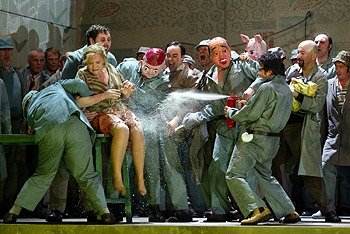
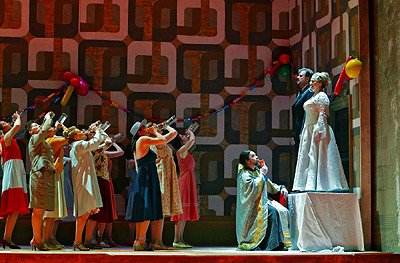
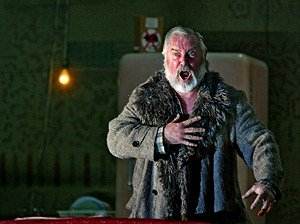
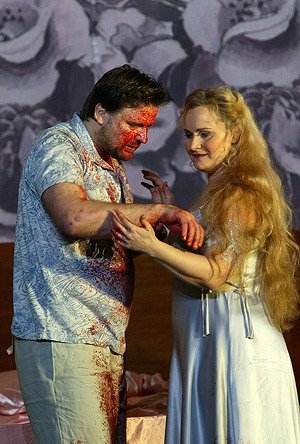
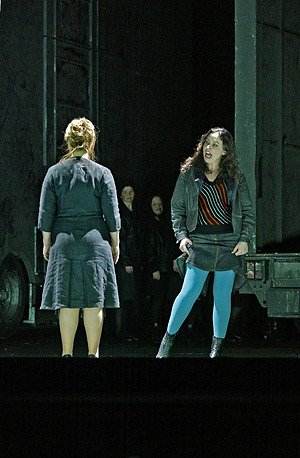
 Return to:
Return to: